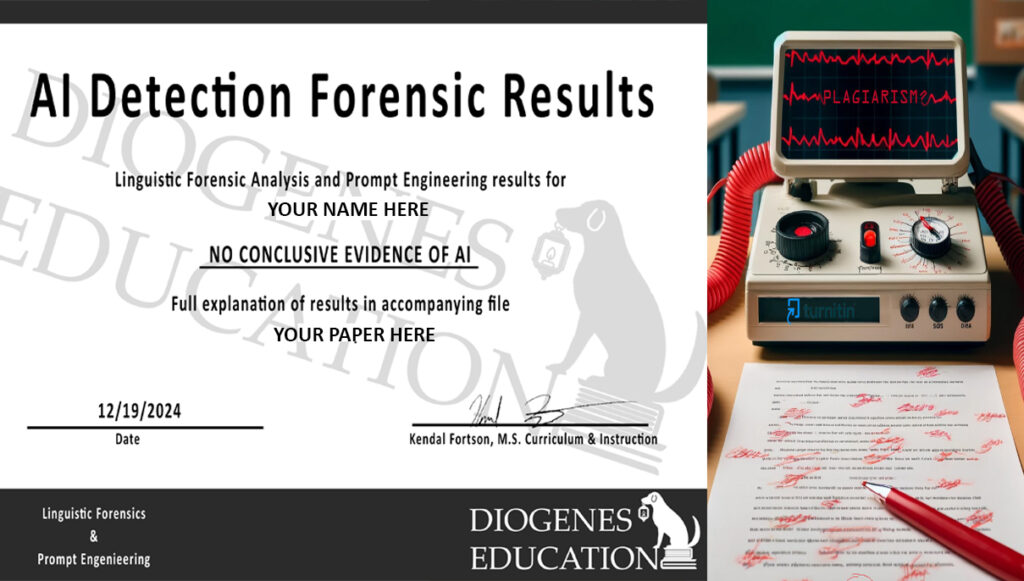

Student Accused of ChatGPT Plagiarism Saved by Independent AI Review
It was the last week of school before winter break, and Annie*, a working mother of three going back to school for a degree in Business Administration, was facing something much worse than a lump of coal from her college as she prepared to celebrate Christmas: expulsion pending the results of an academic misconduct hearing. Annie was accused of using ChatGPT to write her most recent paper… at least, according to the results of Turnitin. The problem was this: According to my own investigation into her work, Annie had not cheated, and yet was now facing the possibility of losing the ability to provide for her children based on a number spit out from a screen without anyone actually going over her paper to check for plagiarism.
Proving to the Professor That There Wasn’t Plagiarism From AI

As an educator with eight years of experience teaching both AP English and AP Psychology and a master’s degree focused on AI in the classroom, author of a research paper on plagiarism detection from ChatGPT, owner of an educational resource company, and a strong belief in the American concept of “innocent until proven guilty”, I have been increasingly concerned with the Kafkaesque reliance on computers judging us in areas of healthcare (the recent scandal regarding United Healthcare’s faulty algorithm resulting in claim denials) and education (educators relying on Turnitin reports to claim plagiarism against a student). The second area in particular bothers me, because after actually employing some linguistic forensics and analyzing Annie’s paper, comparing it with her previous work, and doing some basic prompt engineering in ChatGPT, it became clear that Annie was innocent. I wrote a report based on my investigation and sent it to the university on her behalf.
Proven Innocent of Plagiarism

After an academic hearing, the academic misconduct charge against her were dismissed, and she was re-instated into the program. “You have probably just saved my future and my ability to provide for my kids,” Annie told me. “[S]tarting to pay back student loans while being unable to use my degree, or even mention it under those circumstances to improve my employment and pay, is a terrifying concept. I could never repay you for such an act.”
Many in education have been too quick to accept AI’s judgement regarding plagiarism. When I was invited to speak at NESA’s 2024 Learning Future’s Summit in Athens to deliver a presentation based on my research paper on how trainings could improve teachers understanding of ethical AI and plagiarism issues in schools, I felt that most educators were quick to embrace AI in the classroom without consideration for how those who could not even write a sentence yet might be affected. Nonetheless, I gave my presentation on why we should favor plagiarism detection for teachers using linguistic forensics, prompt engineering, and checking edit histories instead of relying on an AI like Turnitin to catch other AI to a small, yet interested, group.
The Trouble with Turnitin

Different algorithms with different results: AI detection software is unreliable
Annie’s case is just one of many. I don’t blame the teachers who rely on a plug and play method of uploading hundreds of papers to Turnitin and easily giving zeros based on a computer score: teachers are overworked and underpaid, and the promise of AI to reduce workloads is a tempting one… but at what cost? Benjamin Franklin says it is better that 100 guilty persons should escape than that one innocent person should suffer, and innocent students like Annie, a working mother of three facing debt from student loans who would find herself unemployable due to a potentially false plagiarism accusation spit out by a computer, are indeed the ones who will suffer if we offload our education to computers. Is this the kind of Brave New World we were promised? It’s more Kafka’s The Castle than Brautigan’s “All Watched over by Machines of Loving Grace”.
Luckily, Annie’s charges were dismissed, which she attributes to my efforts in actually reading her paper and providing a linguistic forensic analysis. “I am very satisfied. My name was cleared. My academic conduct charge was dismissed.”
Educator’s must remember there is a person behind the number on the screen, and consider the potential effects on that person’s life, before dismissively trusting it. If not for my efforts with Diogenes Education, would Annie be ok?
* Names have been changed to protect the (now proven) innocent
Accused of using AI or ChatGPT in school?
If you were unfairly accused of using AI by a teacher, professor, or Turnitin, and are at risk of poor grades or expulsion, CLICK HERE to contact us.

